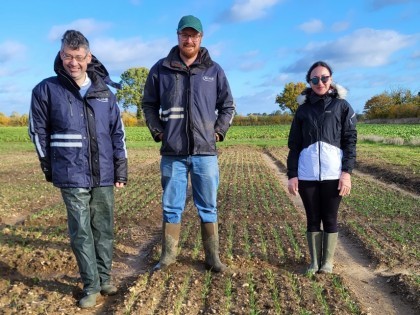
A recently started project aims to assess the environmental impacts of new wheat lines developed at NIAB.
Eda Knight has now joined NIAB's team of Nathan Morris, Stéphanie Swarbreck and Jack Poulden to assess greenhouse gas emissions from field trials conducted as part of a long-term project evaluating novel wheat genotypes for regenerative agricultures, funded by The Morley Agricultural Foundation (TMAF) and described in a previous Landmark article (p22).
Given the new policies aiming at reducing the environmental footprint of agricultural production, such as the Government’s 25-year Environmental Plan and the NFU strategy for farming to reach net zero by 2040, it is important to consider additional criteria besides yield. Ensuring that future wheat varieties have limited environmental impact is imperative.
Regenerative agriculture practices are becoming more popular amongst farmers aiming to continue producing high yields while protecting the soil. However, current commercial crop varieties have been assessed and selected for high yield production under more conventional agronomic practices.
We work with wheat, given its relevance to the UK’s and world’s food security. In addition, as part of its pre-breeding programme NIAB has worked for many years to increase the genetic diversity of wheat. A suite of wheat material has been created with introgressions from re-synthesised wheat (also known as synthetic hexaploid wheat or SHW) as part of the BBSRC-funded Designing Future Wheat programme.
Early data suggest that some lines have reproducible yields that exceed the yield observed for recurrent parent, indicating that the novel introgression lines contain traits that convey a yield advantage.
In parallel, NIAB has a long history in conducting research in agronomy. In particular, the long-term New Farming System (NFS) study supported by TMAF has been exploring ways to reduce tillage and build fertility; these practises are components of regenerative agriculture.

The trial in summer 2023
In Autumn 2022, a team of researchers from NIAB started a multi-disciplinary research project encompassing agronomy, genetics and molecular plant physiology to assess novel wheat genotypes in regenerative agriculture conditions. In agronomic research, the longevity of research projects is critical and therefore, a series of field trials will be conducted over a period of six years.
Following a rotation based on winter wheat, trials will rotate across well-characterised experimental sites in East Anglia, with a known history of management. In the first year, we assessed varieties under a long-term direct drilling field at Childerley in Cambridgeshire, which was established in an eight-year study funded through the NIAB membership scheme.
The field has splits with conventional (deep non-inversion) and low disturbance, direct-drilling approaches that can be used to overlay a fully replicated plot trial looking at fifteen novel wheat genotypes in low and high nitrogen-responsive scenarios. Additional trials will be based at the Morley regional centre in Norfolk, followed by the TMAF-supported Saxmundham experimental site in Suffolk, which was established in 1899, and include low phosphorus treatment.
Eda’s PhD is funded through the CTP-SAI, and is collaborative project including Dr Stéphanie Swarbreck (NIAB), Dr Nick Girkin and Prof. Sofie Sjögersten (University of Nottingham), Dr Lydia Smith (NIAB) and Ron Stobbart (Sainsbury’s). With a combination of fieldwork measurements and modelling, Eda will address the following objectives: (1) assessing mechanisms of genotype-specific regulation of GHG production, (2) quantifying the potential of novel fertiliser application methods and (3) modelling the impacts of novel fertiliser applications on soil structure and health, in combination with genotypes at field to farm scale.
NIAB's Jack Poulden explains more about the project
